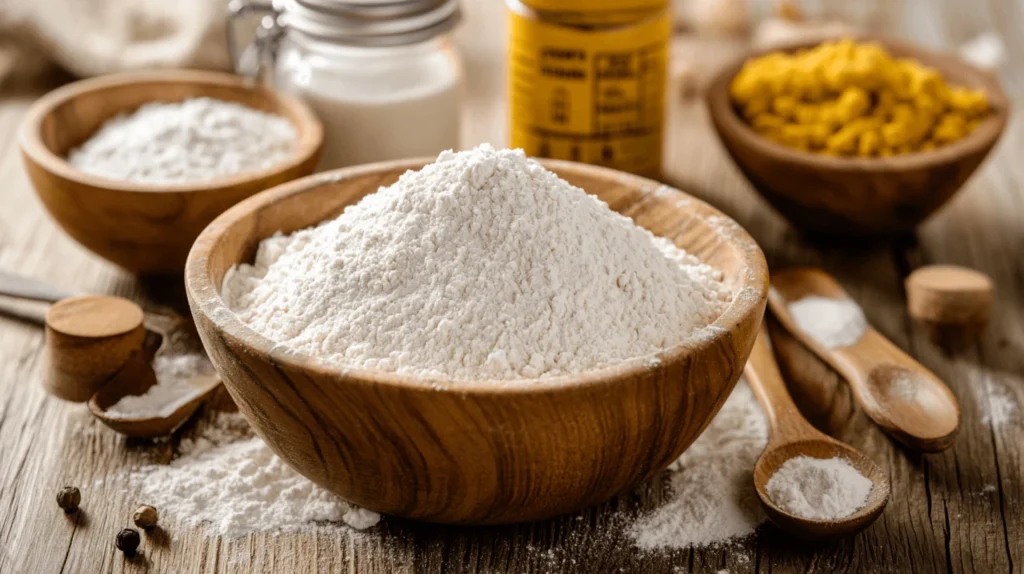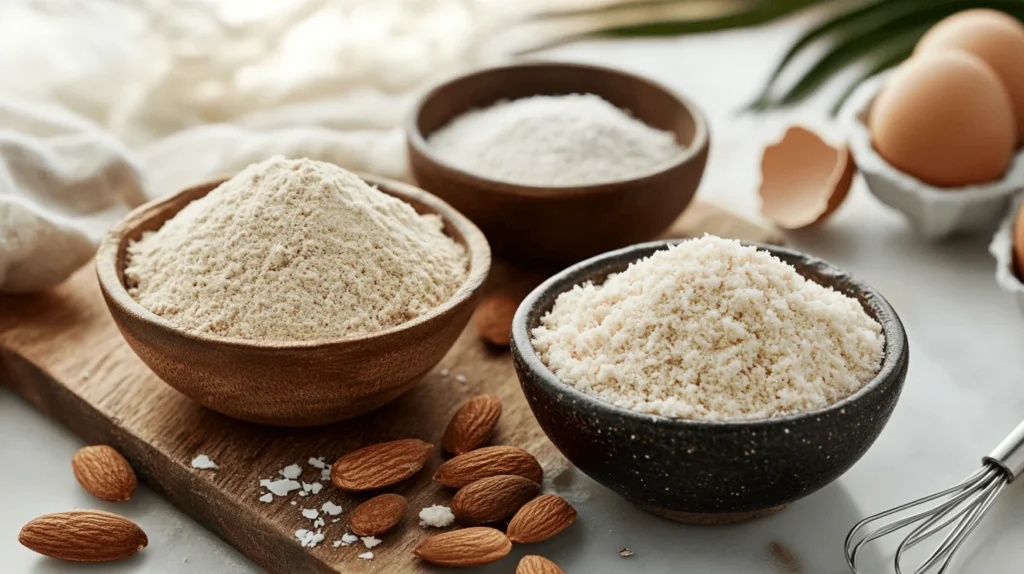When you’re in the middle of preparing a recipe and realize you’re out of Bisquick, panic can set in. The great thing is that there are a variety of simple substitutes for Bisquick that you can use instead. What can you substitute for Bisquick in a recipe? This question comes up often, especially for home cooks trying to avoid trips to the grocery store. Whether you’re baking, cooking pancakes, or preparing other comforting dishes, having the right substitute on hand can help you save time and avoid hassle. In this article, we’ll explore several options, including common pantry items, gluten-free alternatives, and even how to make your own Bisquick substitute at home.
Table of Contents
What is Bisquick? Understanding Bisquick in Recipes
Bisquick is a popular pre-made baking mix that combines flour, baking powder, salt, and fat (usually shortening). It is widely used to prepare quick recipes such as pancakes, biscuits, waffles, and even some desserts. By using Bisquick, cooks can save time in the kitchen, as they don’t need to measure out separate ingredients. For more insights, explore the perfect substitutes for flour in baking, a resource that enhances your understanding of basic ingredients.
The Importance of Bisquick in Recipes
Bisquick has become a staple in many kitchens due to its convenience and versatility. It can be used in both savory and sweet dishes, making it a valuable ingredient for quick meal preparation. The convenience of Bisquick lies in its simplicity; using it allows you to create everything from fluffy pancakes to savory biscuits with minimal effort. If you’re missing Bisquick, it’s important to find a substitute that can match its role in your dish, ensuring similar texture and flavor. For recipes that require precision, check out tips on common mistakes in substitutes.
Popular Bisquick Substitutes: What Can You Substitute for Bisquick in a Recipe?
If you’re wondering what can you substitute for Bisquick in a recipe, it’s important to know that there are a few common pantry items you can use. Depending on the recipe, these substitutes will work in place of Bisquick, keeping the integrity of your dish while potentially offering more control over the ingredients. Let’s explore some popular alternatives to Bisquick:
All-Purpose Flour and Baking Powder: A Simple Bisquick Substitute
One of the simplest alternatives to Bisquick is combining all-purpose flour with baking powder and salt. This mixture can effectively replace Bisquick in nearly any recipe. By mixing 1 cup of flour with 1 1/2 teaspoons of baking powder and 1/2 teaspoon of salt, you’ll have a versatile substitute for Bisquick. What can you substitute for Bisquick in a recipe? This method is perfect for recipes like pancakes and waffles, where the leavening agent is crucial for the texture.
Self-Rising Flour: A Quick Bisquick Alternative
This flour already contains baking powder and salt, making it easier to use without needing extra steps. For consistent results, pay attention to the secret ingredient in achieving great textures.
Homemade Bisquick Recipe: How to Make Your Own Bisquick Substitute.
For those who prefer to make their own substitutes from scratch, a homemade Bisquick recipe can be a convenient and customizable option. You have the flexibility to choose the type of flour, fat, and additional leavening agents to suit your preferences.
Ingredients Needed for Homemade Bisquick Substitute

To create your own Bisquick substitute at home, you’ll need the following ingredients:
- 3 cups of all-purpose flour
- 1/4 cup of baking powder
- 1 tablespoon of granulated sugar
- 1 teaspoon of salt
- 1 cup of shortening (or butter)
Instructions for Making Your Homemade Bisquick Substitute
- In a large bowl, combine the flour, baking powder, sugar, and salt, mixing until everything is evenly incorporated.
- Cut the shortening (or butter) into the dry ingredients using a pastry cutter or fork until the mixture resembles coarse crumbs.
- Store the homemade Bisquick in an airtight container for up to 3 months.
What can you substitute for Bisquick in a recipe? This homemade version allows you to have a ready-to-use mix similar to store-bought Bisquick, with the ability to adjust the ingredients to suit your preferences.
Gluten-Free Bisquick Alternatives: What Can You Substitute for Bisquick in Gluten-Free Recipes?
If you’re following a gluten-free diet, there are several options that you can use to substitute for Bisquick.

Almond Flour and Baking Powder: Gluten-Free Bisquick Substituteu
A great gluten-free option is almond flour combined with baking powder. This substitute works well in many baked goods, including pancakes, muffins, and scones. You can replace Bisquick with a 1:1 ratio of almond flour and baking powder. Be sure to adjust the consistency of the batter if needed, as almond flour tends to be denser than regular flour.
Coconut Flour: Gluten-Free Bisquick Replacement
Coconut flour is another excellent gluten-free alternative. Due to its absorbent nature, you’ll need to use less coconut flour compared to regular flour. Typically, replace 1 cup of Bisquick with about 1/4 to 1/3 cup of coconut flour, and adjust the liquid accordingly. What can you substitute for Bisquick in a recipe? Coconut flour offers a unique flavor and texture, making it a great option for recipes like pancakes or cakes.
Pancake Mix as a Bisquick Substitute: Can You Use Pancake Mix Instead of Bisquick?
In a pinch, pancake mix can serve as an alternative to Bisquick. Most pancake mixes contain the same basic ingredients as Bisquick—flour, baking powder, and salt. Simply swap Bisquick for an equal amount of pancake mix in your recipe. While the texture may vary slightly depending on the brand, pancake mix is a practical substitute when you don’t have Bisquick on hand.
Bisquick Alternatives for Specific Recipes: Best Substitutes for Bisquick in Different Dishes
Different recipes require different substitutes, and it’s important to choose the right one to achieve the desired texture and flavor.
Biscuits and Scones: What Can You Substitute for Bisquick in Biscuits and Scones?
For biscuits and scones, you need a substitute that creates a light, flaky texture. Self-rising flour and homemade Bisquick mixes are great options. The key to success is using cold fat (butter or shortening) and handling the dough minimally. This will ensure a flaky result. What can you substitute for Bisquick in a recipe? Both alternatives work well to make soft, fluffy biscuits or scones.
Pancakes and Waffles: Best Substitutes for Bisquick in Pancakes and Waffles
For pancakes and waffles, texture is key. A combination of all-purpose flour and baking powder works best in these cases. Pancake mix is also a viable substitute if you’re in a hurry. Make sure to adjust the liquid in the recipe to get the desired consistency. What can you substitute for Bisquick in a recipe? You want a batter that is thick yet pourable, perfect for making light, fluffy pancakes or crispy waffles.

Why Substituting Bisquick Can Be Beneficial: What Can You Substitute for Bisquick to Improve Your Recipe?
Substituting Bisquick in recipes offers many benefits. One key reason people seek alternatives is to gain control over the ingredients. If you want to avoid gluten, reduce processed ingredients, or simply don’t have Bisquick, substitutes can deliver the same results without affecting taste or texture. Making your own Bisquick substitute gives you the flexibility to experiment with various types of flour or fat. This allows you to create more customized dishes suited to your preferences.
Tips for Perfect Results with Bisquick Substitutes: What Can You Substitute for Bisquick for the Best Outcome?
When substituting Bisquick in recipes, there are some key factors to keep in mind to ensure the best outcome.
Adjusting Consistency: How to Modify Bisquick Substitutes for the Perfect Texture
One of the most important considerations when using a Bisquick substitute is adjusting the consistency. What can you substitute for Bisquick in a recipe? Depending on the substitute you choose, you may need to add more or less liquid to achieve the right batter or dough consistency. Always check the texture and adjust accordingly.
Flavor Considerations: How Substitutes Affect the Flavor of Bisquick Recipes
Another important factor is flavor. If you’re using a gluten-free flour like almond flour or coconut flour, the flavor may change slightly. What can you substitute for Bisquick in a recipe? Be mindful of the taste difference and consider how it will impact the final dish. Adding spices or other flavor enhancers can help balance any differences.
Common Mistakes When Substituting Bisquick
While substituting Bisquick can be a simple process, there are a few common mistakes that people make.
Misunderstanding Ingredient Ratios
One of the most frequent errors is not understanding the proper ratios when substituting ingredients. What can you substitute for Bisquick in a recipe? Whether you’re using self-rising flour, almond flour, or a homemade version, it’s crucial to get the correct proportions for your recipe to preserve both texture and flavor.
Overcomplicating the Process
Another mistake is overcomplicating the substitution process. People often add too many ingredients or try to alter the recipe too much when using substitutes. What can you substitute for Bisquick in a recipe? Stick to the basics, and don’t be afraid to experiment with small adjustments if needed.
FAQs about Substituting Bisquick in Recipes
Can I use regular flour instead of Bisquick?
Yes, you can use regular flour, but you’ll need to add baking powder and salt to achieve the proper leavening, as these are essential components of Bisquick. A typical ratio is 1 cup of flour, 1 1/2 teaspoons of baking powder, and 1/2 teaspoon of salt to replace 1 cup of Bisquick.
Is there a gluten-free option for Bisquick?
Yes, there are several gluten-free options. You can substitute almond flour or coconut flour for Bisquick. For the best results, combine these with baking powder and adjust the amount of liquid to achieve the correct consistency. Many gluten-free flour blends are also available and can be used as a Bisquick alternative.
How can I make a homemade Bisquick substitute?
Making a homemade Bisquick substitute is simple. Combine 3 cups of all-purpose flour, 1/4 cup of baking powder, 1 tablespoon of sugar, 1 teaspoon of salt, and 1 cup of shortening (or butter). Mix until it resembles coarse crumbs, and you have your own Bisquick mix ready to use.
Can I use pancake mix instead of Bisquick?
Yes, pancake mix can be used as an alternative to Bisquick. Since both contain similar ingredients like flour, baking powder, and salt, you can substitute it on a 1:1 ratio in most recipes. However, be aware that some pancake mixes may contain additional sugar or flavoring, which could slightly alter the taste of your dish.
Does the taste change with substitutes?
The taste may change depending on the substitute you use. For instance, using almond flour or coconut flour will give a distinct flavor, while using pancake mix might introduce a slight sweetness. If the taste is important, consider adjusting other ingredients like spices to balance the flavors.
Can I use a store-bought mix instead of Bisquick?
Yes, you can use other store-bought baking mixes in place of Bisquick. Many brands offer similar baking mixes that include the same basic ingredients—flour, baking powder, and salt. You can use these in a 1:1 ratio, but check the label to see if any adjustments need to be made for specific recipes.
Conclusion
Substituting Bisquick in a recipe is not as difficult as it may seem. With the right ingredients and a little know-how, you can easily replace Bisquick with alternatives like all-purpose flour, self-rising flour, or even gluten-free options like almond flour. The key to success is understanding how each substitute works and adjusting accordingly to maintain the right texture and flavor. What can you substitute for Bisquick in a recipe? With these options at your disposal, you’ll be able to create your favorite dishes without any fuss.

